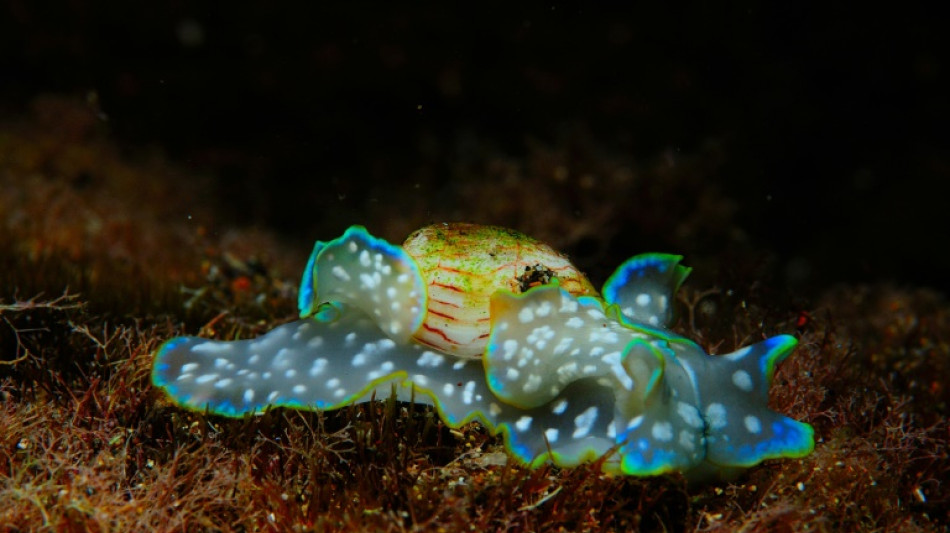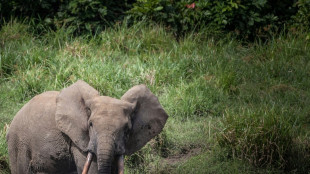
-
 Leipzig lose more ground on Bayern with Hoffenheim loss
Leipzig lose more ground on Bayern with Hoffenheim loss
-
Arsenal back to winning ways, Chelsea up to third in Premier League

-
 Sinner powers Davis Cup holders Italy past Australia to final
Sinner powers Davis Cup holders Italy past Australia to final
-
Andy Murray to coach Novak Djokovic

-
 Leipzig lose ground on Bayern, Dortmund and Leverkusen win
Leipzig lose ground on Bayern, Dortmund and Leverkusen win
-
Fear in central Beirut district hit by Israeli strikes

-
 Chinese film about Covid-19 wins Taiwan's top Golden Horse prizes
Chinese film about Covid-19 wins Taiwan's top Golden Horse prizes
-
Tuipulotu puts anger behind him as he captains Scotland against native Australia

-
 Inter smash Verona to take Serie A lead
Inter smash Verona to take Serie A lead
-
Mass rape trial sparks demonstrations across France

-
 Lebanon says 15 killed in Israeli strike on central Beirut
Lebanon says 15 killed in Israeli strike on central Beirut
-
Eddie Jones will revel in winding up England - Genge

-
 Chelsea see off Leicester on Maresca's King Power return
Chelsea see off Leicester on Maresca's King Power return
-
Storms bring chaos to Ireland, France, UK

-
 Berrettini gives Italy edge on Australia in Davis Cup semis
Berrettini gives Italy edge on Australia in Davis Cup semis
-
Amber Glenn storms to gold in Cup of China

-
 High-flying Chelsea see off Leicester
High-flying Chelsea see off Leicester
-
Climate-threatened nations stage protest at COP29 over contentious deal

-
 Families fleeing after 32 killed in new sectarian violence in Pakistan
Families fleeing after 32 killed in new sectarian violence in Pakistan
-
Ancelotti says 'ugly' to speculate about Mbappe mental health

-
 Failure haunts UN environment conferences
Failure haunts UN environment conferences
-
Colapinto in doubt for Las Vegas GP after crashing

-
 Lebanon says 11 killed in Israeli strike on central Beirut
Lebanon says 11 killed in Israeli strike on central Beirut
-
Three arrested in Spain for racist abuse at Liga Clasico

-
 Pope to skip Notre Dame opening for Corsica visit
Pope to skip Notre Dame opening for Corsica visit
-
Tokyo police care for lost umbrellas, keys, flying squirrels

-
 Neuville closes in on world title after Rally Japan recovery
Neuville closes in on world title after Rally Japan recovery
-
Jaiswal slams unbeaten 90 as India seize control against Australia

-
 'Nice surprise' for Verstappen to edge Norris in Las Vegas GP qualifying
'Nice surprise' for Verstappen to edge Norris in Las Vegas GP qualifying
-
Indian teen admits to 'some nerves' in bid for world chess crown

-
 Patrick Reed shoots rare 59 to make Hong Kong Open history
Patrick Reed shoots rare 59 to make Hong Kong Open history
-
Record-breaker Kane hits back after England criticism

-
 Cameron Smith jumps into lead at Australian PGA Championship
Cameron Smith jumps into lead at Australian PGA Championship
-
Russell on pole position at Las Vegas GP, Verstappen ahead of Norris

-
 Philippine VP made 'active threat' on Marcos' life: palace
Philippine VP made 'active threat' on Marcos' life: palace
-
Celtics labor to win over Wizards, Warriors into Cup quarters

-
 Balkans women stage ancient Greek play to condemn women's suffering in war
Balkans women stage ancient Greek play to condemn women's suffering in war
-
Nvidia CEO says will balance compliance and tech advances under Trump

-
 Grand Slam ambition dawning for Australia against Scotland
Grand Slam ambition dawning for Australia against Scotland
-
Japan game set to leave England with more questions than answers

-
 Amorim's to-do list to make Man Utd great again
Amorim's to-do list to make Man Utd great again
-
What forcing Google to sell Chrome could mean

-
 Fears for Gaza hospitals as fuel and aid run low
Fears for Gaza hospitals as fuel and aid run low
-
Anderson to Starc: Five up for grabs in IPL player auction

-
 Big money as Saudi makes foray into cricket with IPL auction
Big money as Saudi makes foray into cricket with IPL auction
-
Budget, debt: Trump's Treasury chief faces urgent challenges

-
 Trump names hedge fund manager Scott Bessent as Treasury chief
Trump names hedge fund manager Scott Bessent as Treasury chief
-
Putin vows more tests of nuke-capable missile fired at Ukraine

-
 Yin avoids penalty to keep lead as Korda charges at LPGA Tour Championship
Yin avoids penalty to keep lead as Korda charges at LPGA Tour Championship
-
With favourites out MLS playoffs promise more upsets


Their time to slime: who will be 'Mollusc of the Year'?
Will you choose beauty? The carnivorous Wavy Bubble Snail, perhaps, with its billowing skirts shimmering under UV light. Or will it be age? Like the venerable 500-year-old Methuselah oyster.
Or will you be seduced by the leopard slug with its gymnastic mating ritual?
The list of finalists for Mollusc of the Year has something for everyone.
In a public vote ending Sunday, five species of soft-bodied invertebrates are vying to follow in the illustrious trail of previous winners, dubbed the "world's most beautiful snail" and "weirdest octopus".
The grand prize? The triumphant species will have its genome decoded to better understand its evolution and potential benefits to humanity.
The International Mollusc of the Year competition, which kicked off this month, is run by the LOEWE Centre for Translational Biodiversity Genomics, based in Germany.
Organisers have whittled down the field from 85,000 mollusc species, thanks to nominations by researchers from around the world.
By definition, pageant entrants have a head, an intestine sac and a muscular "foot" for motion.
The animal group is one of the most diverse in terms of shapes, sizes, habitats and behaviours, ranging from the deep sea colossal squid to garden slugs.
Molluscs have been around for more than 500 million years and are the second largest phylum of animals after insects.
But they are shrouded in mystery. "Of all invertebrates, molluscs are most valued by man, but surprisingly are an often neglected phylum in genomic research," laboratory manager at the LOEWE Centre TBG Carola Greve told AFP.
The contestants may be boneless, but this year's competition is stiff.
To help voters navigate the ballot, here's a rundown of the nominees:
- Punk slug -
Hailing from the rocky intertidals of the US Pacific coast, the thick-horned nudibranch is surely the most "punk" of the finalists.
The stunning sea slug is the length of a matchstick, gleams like frosted glass, and has a signature shock of neon orange and white striped "horns".
Used for respiration, these outgrowths are also loaded with venomous stinging cells poached from prey it consumes.
Decoding its genome would yield insights on the learning process -- the species has a simple nervous system used to study conditioned behaviours, associative learning, and memory formation.
- Giant of the deep -
Looking for the secrets to long life?
The giant Methuselah oyster can grow up to 30 centimetres (12 inches) across and has a record-breaking five-century lifespan.
But the coy clam did not have a scientific name until 2009 due to its preference for living at difficult-to-reach depths of around one kilometre in the Atlantic and Mediterranean oceans.
Its larvae begin life as nomads before cementing themselves to protective surfaces that become hanging oyster reefs over time.
Decoding its genes would produce insights into its extraordinary longevity.
- Psychedelic snail -
If this election turned on appearances, the Wavy Bubble Snail would be a frontrunner.
The only thing more psychedelic than its name is its electric rainbow edged-body, yellow shell and white spots.
"They are like small candies in a vast ocean filled with invertebrate predators," the nominating researchers told AFP.
In the shallow intertidal pools of the Atlantic Ocean it calls home, this tiny species is nearly impossible to detect.
But the captivating carnivore -- it eats tiny bristly ringworms -- has hidden talents: it glows green and red under UV light.
Its genetic code could unravel the evolutionary processes that lead to snail-specific structures and their jump from oceans to terrestrial environments.
- Plucky paramour -
The nocturnal leopard slug is the sole land-dweller slinking into the top five.
Known as the "gardener's friend" because of its taste for debris and fungi, the mollusc has an appealing brown and black pattern, can grow up to 20 centimetres long, and is often kept as a pet.
"Do you know of any other animal that -- after courting for a few hours -- will climb a tree together and rappel down afterwards just for intercourse?" said the nominating team.
Despite its leisurely pace, this hermaphrodite slug has spread from Europe to most other parts of the world.
A vote for studying the leopard slug genome would shed light on its successful adaptation, especially under climate change.
- 'Loco' -
Last but not least is the Chilean abalone, also known as "loco" in its South American home waters.
A top predator and keystone species, this rugged sea snail with a shell length of up to 15 centimetres is also a worldwide delicacy.
If it wins, unlocking loco's genome could reveal immunotherapy treatments for certain cancers, and insights on how to protect marine invertebrates from overexploitation and pollution.
The victorious mollusc will join the 2021 winner the Greater Argonaut octopus -- known as the paper nautilus because females produce a thin shell to shield their eggs -- and 2022's spectacular Cuban painted snail.
B.Shevchenko--BTB


